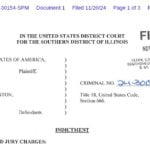College of DuPage (ECWd) –
In yet another round of Freedom of Information Act request denials, the College of DuPage has actually admitted to there being at least one EEOC complaint filed against Catherine Brod, one of its employees.
In a FOIA request seeking copies of “all EEOC complaints filed against Katherine Brod since 2009“, the College denied the records, improperly applying several exemptions, however note that they did not claim they don’t have the records! Lets look at their lawyers work on this denial.
UPDATE: Kathrine Brod is an employee of COD as the VP Dev/Exec Dir College of DuPage Foundation and makes over $193,643.00 per year.
Section 7(1)(a) of FOIA
Section 7(1)(a) of FOIA states: “<span style="font-family: Courier New; font-size: small;">Information specifically prohibited from</span> <span style="font-family: Courier New; font-size: small;"><em>disclosure by federal or State law or rules and regulations implementing federal or State law.</em>"</span>
That sounds reasonable…and the FOIA Officer even explained where the college thought the information was prohibited from disclosure: Title VII of the Civil Rights Act of 1964, the college notes, specifically prohibits disclosure to the public of a charge alleging an employer has violated the Act. The college even went so far as quoting from the Act that the “Equal Employment Opportunity Commission shall serve notice of the charge on the employer, and such charge shall not be made public.”
So what is the problem? The college left out the last three words of the sentence they quoted, which are “by the Commission.”
It actually reads: “Equal Employment Opportunity Commission shall serve notice of the charge on the employer, and such charge shall not be made public by the Commission.” – and that means that the Commission cannot release the information, it says nothing about anyone else releasing the information and more importantly it does not specifically prohibit the disclosure of the information, which is a requirement if this Section of FOIA is to be applied to the denial. Read the U.S. Code here: section 2000e-5 at 706(b).
After considerable research on the other EEOC provisions the college quoted, I found they all had the same or similar language, that the EEOC or Commission would not release the records – and did not state the records were prohibited from release.
This exemption is without merit – there is no state or federal law, regulation, or rule invoked by the college that specifically prohibits disclosure of these records.
Section 7(1)(c) of FOIA
This exemption was quoted by the college as stating: “<span style="font-family: Courier New; font-size: small;">Personal information contained within public</span> <span style="font-family: Courier New; font-size: small;">records, the disclosure of which would constitute a clearly unwarranted invasion of personal privacy</span>…“
Once again, the college conveniently left out the last sentence of this paragraph, which reads: “<span style="font-family: Courier New; font-size: small;"><em>The disclosure of information that bears on the public duties of public employees and officials <span style="text-decoration: underline;">shall not be considered an invasion of personal privacy</span></em>."</span>
Obviously complaints against a public employee do bear on their public duties and this claimed exemption is also without merit.
To summarize, this is an improper denial based on the exemption claims made by the college. The FOIA requires production of these records, with the exempted portions redacted (Section 7(1) of FOIA) – by exempted portions I mean personal identifying information of the person who lodged the complaint, not of the person the complaint was against.
Read the denial below:
[gview file=”https://edgarcountywatchdogs.com/wp-content/uploads/2015/02/47-FOIA-Allen-Response-2-12-15-EEOC.pdf”]








1 Comment
Jerry
Posted at 22:36h, 12 FebruaryThis is ridiculous! They will gp to the ends of the earth to make our lives harder.